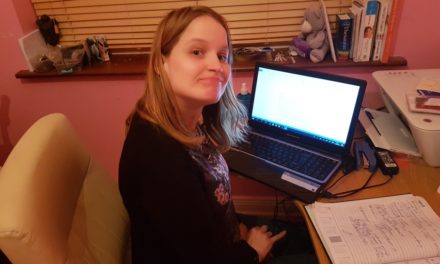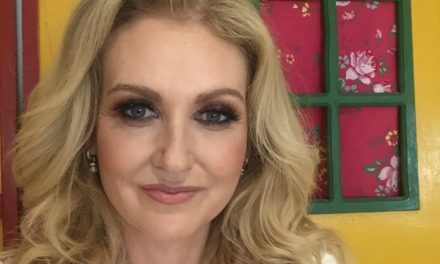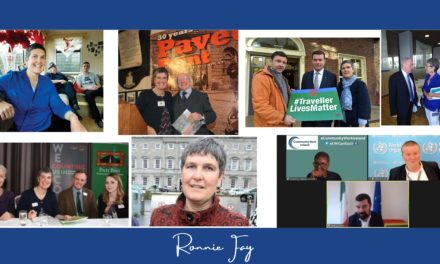When reporter Ray Lucey met with female community health workers from the Offaly Traveller Movement, a new world was opened up to him.
It was only two short years ago when the Irish State gave Travellers national recognition as an ethnic minority, but it seems that has made very little difference in the reality of everyday life.
On a mid-March morning in Tullamore, I met with female community health workers who were members of the Offaly Traveller Movement (OTM). After they welcomed me warmly – with coffee and some introductory conversation – we discussed the real lives of Travellers and their issues. I asked about the abovementioned recognition and what that actually meant to them today.
Mags Lovett, OTM health manager, said: “It’s better to get than not to get, but what does it mean?”
Young children in school are encouraged to be proud of their Traveller origins, but by the time they reach adulthood, they will almost certainly have experienced discrimination.
Furthermore, eye-watering, savage cuts of 87% to Traveller organisations in 2011 have left the sector poorly resourced and, as a result, many essential services are not provided for within the community.
I got the feeling from the women present that support from government departments for the Traveller community was somewhat patronising and tokenistic.
81% unemployed
“I don’t think they’re really taking us seriously. They’re just funding us for the craic of it, you know,” says Lilly Kavanagh.
During the group interview, Mags presented me with some stark statistics that clearly illustrated the key areas that are crying out for urgent action:
• Unemployment is at 80% within the Traveller community; the average national rate is 5.4%
• Suicides among Travellers occur at six times the rate they do in the general population
• Traveller men live 15 years less and women 11.5 years less than their counterparts in the settled population
• Infant mortality rates are 3.5 times higher than within the general population
Underlying this sense of a government simply paying lip service, I found the women hardened by decades of cruel discrimination. I could see the hurt in their faces as they revealed how such incidences made them feel. Often, discrimination occurred in public places.
“Everybody is looking at you… It makes you very low,” they agreed.
In one incident that happened only recently, a bar worker blatantly declared, “You’re not getting anything here; you’re nothing but a pack of knackers.”
Travellers seeking service at a shop or a pub, for example, may be accused of previous misbehaviour and have to counter these accusations, often within the earshot of other customers who may know them.
Funeral frustration and wedding woes
Another issue is the complete closure of businesses in towns during Traveller funerals and celebrations.
Pinkie (Bridget) McInerney says that, years ago, this was not the case. She cited the example of her own mother’s funeral, when the streets of Birr were lined with people paying their respects. Years later, she was utterly frustrated trying to locate a venue for her daughter’s wedding, travelling far and wide and finding it was a futile exercise, even with the assistance of a wedding planner.
Often, weddings can cost significantly more for Travellers. Sarah McDonagh spoke about a wedding that was hit by an additional €4,000 charge for security (non-refundable). Other cases were cited of parties being refused entry to hotels on actual wedding days. The women even recalled a phone call to a wedding party when it was already in the church to say the reception could not go ahead at the booked venue.
Even with all the recent equality legislation, the women say business owners will often use indirect methods of discrimination to prevent Travellers accessing their services. Staff are trained to say such things as, “locals only” or “private function” when, in reality, this is not the case; they are just excuses to deny Travellers entry.
Based on her personal experiences, Pinkie said: “I don’t know if that equality thing is doing anything. No discrimination against Travellers? It’s still there.”
I asked the group of women questions about issues highlighted in the mainstream media that present Travellers negatively.
On domestic violence, I asked whether it was really more prevalent within the travelling community.
“They say it’s part of our culture, but it isn’t – it’s not a part of anyone’s culture,” Sarah said.
I raised the issue of people saying that Travellers don’t pay tax.
“Sure, they won’t give us jobs to do anything,” replied Pinkie.
Referring to those Travellers who are lucky enough to secure some employment, Pinkie said: “A few fellas are on the buildings, there are some women in projects like this, and some are self-employed. Plenty are willing to work, but to get a regular job, Travellers have to deny who they are.”
Changing surnames
She said that, in many cases, Travellers have to change their surnames to gain employment.
In 2019, Travellers are not part of a more inclusive society, said Mags. “There are changes to public policy and stuff, but we’re not seeing any changes.”
Meeting this group in Tullamore, I learned a lot about Travellers’ issues and culture. I enjoyed the banter, especially when they spoke Cant [language of Irish Travellers] and I didn’t know what they were saying. (They found my wild guesses amusing!)
I look forward to meeting them again with their families at the 2019 Offaly Traveller Pride event this June, which settled people and Travellers celebrate together.
Irish want class discrimination recognised
Elsewhere, young Irish people have been fighting for equality across the board through a campaign for class discrimination to be legally recognised.
All Together in Dignity (ATD) Ireland supported eight young delegates to take part in the European Fourth World People’s University, held at the European Parliament in February.
Armed with ADT research, the group argued that not having socio-economic deprivation recognised in Irish law as a ground for discrimination has had a negative impact on people from disadvantaged backgrounds.
“At present, within Irish law, there are nine recognised grounds of discrimination, but we are working to try and add a 10th ground, one based on a person’s socio-economic status,” said the group.
Traveller Selina O’Leary’s Siberian experience
Traveller and singer Selina O’Leary, 27, from Carlow, flew to Siberia recently to live with a nomadic tribe of reindeer herders for 10 days.
While she wasn’t gone on the raw fish diet, she made a real connection with the family who hosted her in the Siberian tundra in northern Russia.
Selina went as part of Traveller’s Guide, a two-part RTÉ documentary in which she and another Irish Traveller left home to experience day-to-day life and culture in other nomadic communities. The show was broadcast on RTÉ 1 in March.
She said she would “go back again in half a heartbeat” to the Nenet tribe. They lived lives far from services we take for granted, but were generally much healthier than us.
Interested in reading more about the state of Ireland’s community development sector? Check out our latest issue.





